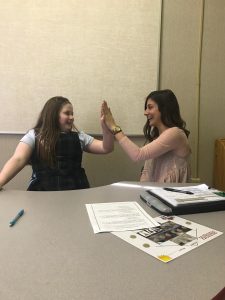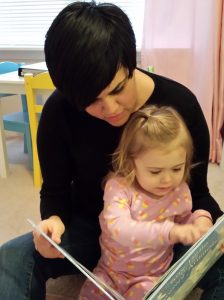PROGRAM DESCRIPTION:
The Knapp Center’s ABA Outreach Program is an empirically-based treatment model that utilizes the principles of Applied Behavior Analysis (ABA) to increase the acquisition of developmentally-appropriate behaviors, while reducing problematic behaviors that interfere with the child’s learning. This treatment model is unique from our other treatment programs, in that treatment occurs in the child’s home, community and/or school settings. Providing ABA treatment in these natural environment settings, allows for frequent opportunities for the child to practice the targeted skill in the environment in which the skill is expected. Oftentimes children who warrant this type of service, have difficulty generalizing skills across people, settings and stimuli. This program is also a program of choice for children who desire ABA after school only, request assistance with school functioning and/or require help for expected behaviors in the community.
One ABA teaching modality used in our ABA Outreach Program to teach language, social skills, play/leisure and adaptive skills, is Discrete trial training (DTT). DTT is a method for individualizing and simplifying instruction to enhance a child’s learning. The key to using this method is breaking complex skills into steps and teaching each step systematically through multiple learning trials, prompts, data collection and reinforcement. Learned skills are then practiced in the natural environment in novel situations utilizing ABA natural environment teaching strategies.
It should also be noted that the ABA methodology utilized in our ABA Outreach Program has been endorsed as a scientifically-validated approach for treating children with autism by the United States Surgeon General, American Academy of Pediatrics, American Academy of Neurology, The National Institute of Child Health & Human Development, amongst many others. Services within the Knapp Center ABA Outreach Program can parallel the intensity of ABA services available in our on-site programs, as the number of hours of treatment per week may range from 4-40 hours per week. Studies have found that intensive ABA, indicated as 25 hours per week or more, implemented early in life, produces large gains in development and reduces the need for special services later in life. The need for greater or lesser intensity of service within the ABA Outreach Program is adjusted to the individual’s need for treatment, as determined by the severity of presenting symptoms, while selecting the least restrictive services necessary.
When providing treatment in the home, community and/or school setting, this promotes the transfer of skills from the Registered Behavior Technician (RBT) to the client, family, teachers, and other members of the client’s treatment team since they are consistently modeling the interventions for other members of the treatment team. A Board Certified Behavior Analyst (BCBA) also provides training, modeling and feedback to the treatment team regarding their implementation and child’s progress.
PROGRAM GOAL:
The Knapp Center’s Outreach Program objective is to implement research-based intervention to improve developmentally-appropriate behavior through focusing on the child’s individualized strengths and needs. Emphasis is placed on improving areas of development that include language, academic, social, play/leisure and adaptive functioning. Parents participate in on-going training to learn strategies to promote consistency across environments to strive towards optimal treatment gains. More broadly, it promotes the opportunity for skills to be transferred to the family in order to promote greater knowledge and independence in utilizing ABA interventions with their child. The goal is to be able to titrate support, while leaving the client, parents, teachers, etc. with the necessary skills to maintain treatment gains over time in their natural environment. It is the Knapp Center’s mission to provide the highest-quality, ABA intervention to improve the child’s quality of life so that they are able to function independently at their optimal potential.
POPULATION SERVED:
Children diagnosed with Autism Spectrum Disorder, combined with co-existing anxiety, depression, ADHD and/or learning disabilities, ages 2-22. These children demonstrate cognition ranging from moderate/severe impairment to superior cognitive potential. Oftentimes children who warrant this service, have difficulty generalizing skills across people, settings and stimuli. This program is appropriate for children and adolescents who require intervention in the settings where their problematic behaviors occur.
PROGRAM STAFFING:
Each child in the program is served 1:1 by a Registered Behavior Technician (RBT). Educational background of RBTs include bachelor’s degrees in psychology, education or a related field. Each child in the program is also assigned a master’s-level Board Certified Behavior Analyst (BCBA) who supervises the RBT and the treatment of the child. BCBAs provide direct care and supervision weekly to each child 1-2 times per week. Finally, the Chief Clinical Coordinator and Executive Director of the Knapp Center, provide oversight of the program.



